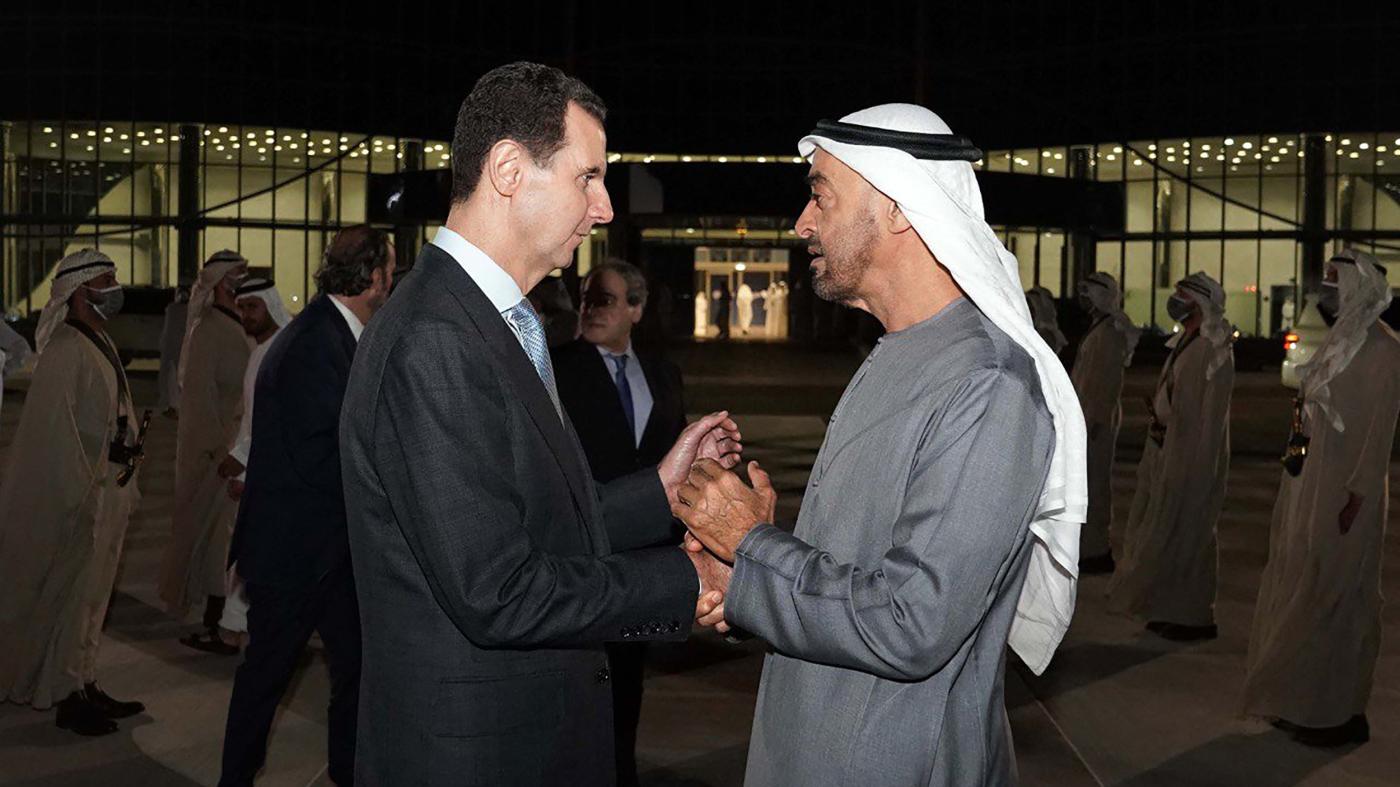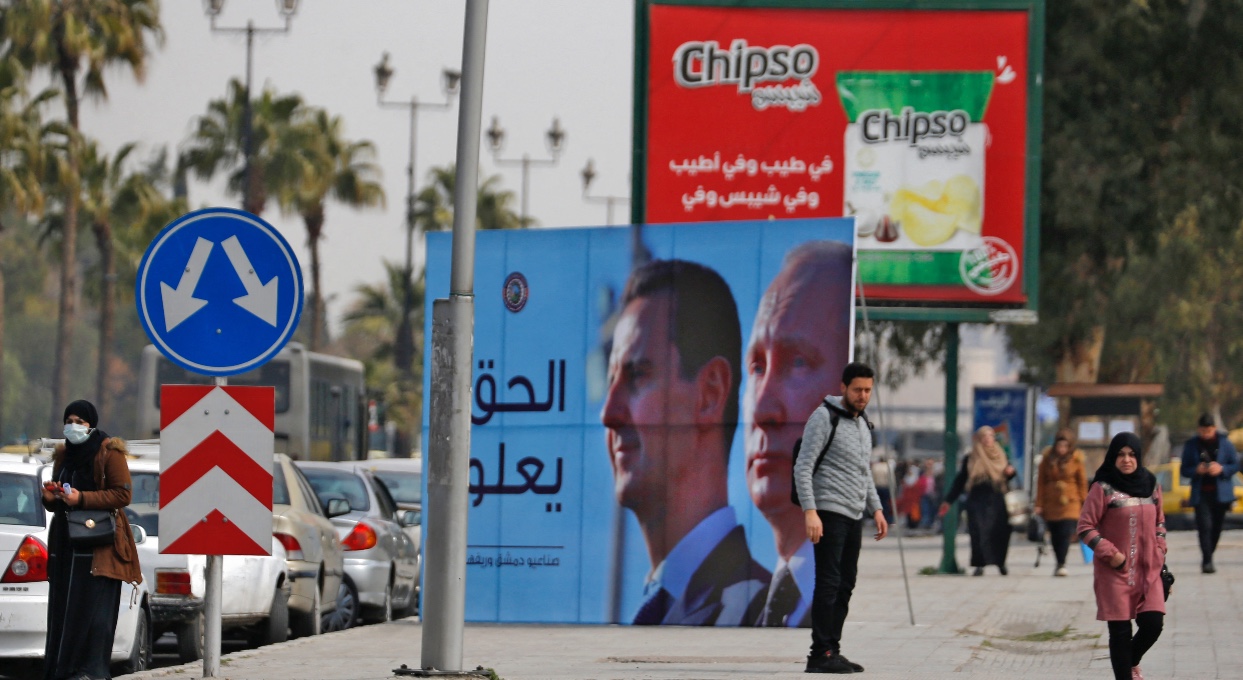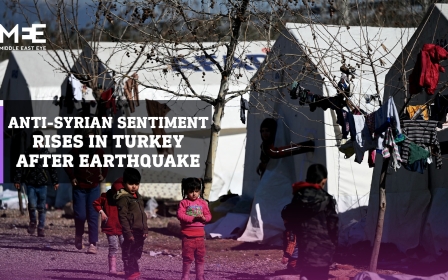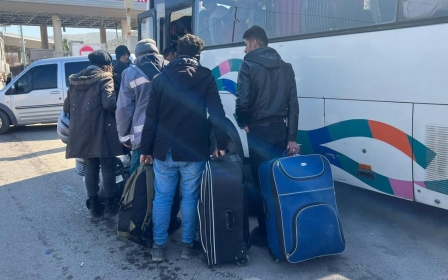Syria earthquake: 'Inflection point' for normalisation with Bashar al-Assad
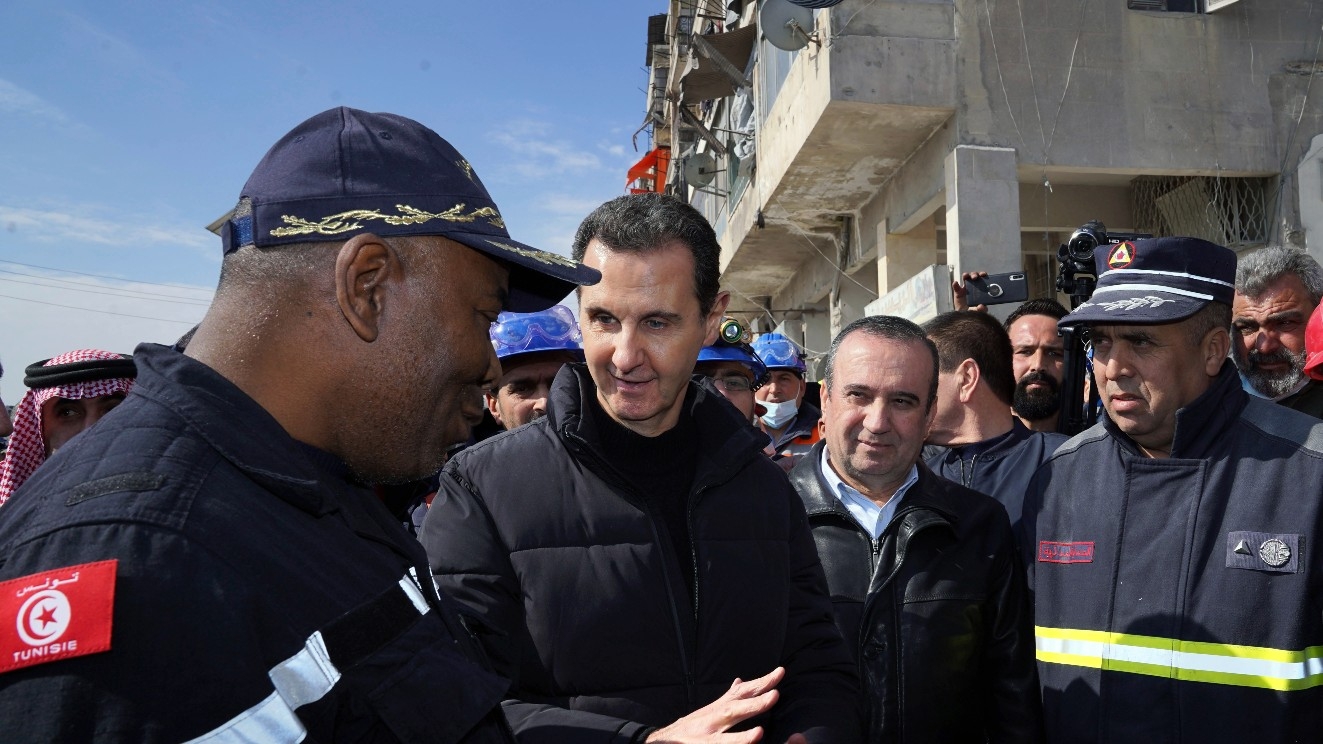
Arab countries are accelerating efforts to reestablish ties with Syrian President Bashar al-Assad in the aftermath of two deadly earthquakes, potentially deepening the chasm between regional capitals that want to bring Damascus in from the cold and western powers opposed to normalisation.
Since the twin quakes struck in southern Turkey and northern Syria last week, killing at least 41,000, Assad has fielded condolence calls from fellow Arab rulers, received aid from rich Gulf states, and even won a pledge from Tunisia to strengthen ties with his government.
'Assad and Emirati President Mohamed bin Zayed enjoy excellent relations'
- Senior Arab intelligence officer
The most prominent diplomatic visit in the last two weeks, however, came from Jordan, one of Washington's most stalwart allies in the region. Foreign Minister Ayman Safadi met with Assad in Damascus on Wednesday, marking the first such trip since the Syrian war erupted a decade ago.
While Jordan is heavily reliant on the US for aid, the Hashemite kingdom has gone against bipartisan consensus in Washington that continues to call for treating Assad as a pariah. In October 2021, King Abdullah II held a phone call with Assad.
“This is an inflection point in a four-year trend for actors who want to move forward with normlisation,” Natasha Hall, a senior fellow at the US-based Centre for Strategic and International Studies, told Middle East Eye.
“We are seeing high-level diplomats meeting Assad and also real material support going to the regime,” she added.
A rare opportunity
On Wednesday, the UAE announced an additional $50m in aid to the quake-hit country, bringing the total aid pledged by the Emiratis to $100m; and 38 flights have already departed the UAE, carrying 1,243 metric tonnes of food and medicine, according to Emirati state media.
The UAE has been at the forefront of a trend to bring Assad back into the regional fold. A senior intelligence official from an Arab state neighbouring Syria told MEE that Assad and Emirati President Mohamed bin Zayed “enjoy excellent relations”.
The UAE reopened its Syrian embassy in 2018. Last year, Assad visited Abu Dhabi and Dubai during his first trip to an Arab state since the start of the Syrian war.
“The Emirates are leading on the diplomatic response to the quake and Saudi Arabia is watching,” Andrew Tabler, a senior fellow at Washington Institute for Near East Policy and former Syria director on the White House National Security Council, told MEE.
Like the UAE, Saudi Arabia backed rebels in the early days of the Syrian war. In 2021, Saudi intelligence chief Khalid al-Humaidan visited Damascus, but Riyadh has been slower to reengage with Syria than its smaller Gulf neighbour.
On Tuesday, a Saudi plane loaded with aid landed in government-controlled Aleppo, marking the first such visit since the two countries severed ties in 2012.
“Countries that have been inclined to support Assad have leapt at the opportunity the earthquakes present,” Dareen Khalifa, senior Syria analyst at the International Crisis Group said, but cautioned that it doesn’t necessarily put Damascus on a fast track to normalisation.
“Sending aid in this situation is not equal to normalisation,” Khalifa told MEE.
A day after the quake, Assad received a call from Egyptian President Abdel Fattah el-Sisi, the first between the two leaders.
Egypt pledged to help "restore Syria's position in the Arab world" after a 2021 meeting in New York between the two countries' foreign ministers, but Cairo has been lukewarm on going beyond rhetoric. For example, a senior European official said recently that Egypt is reluctant to supply gas to Lebanon via Syria because of US sanctions.
“Egypt is concerned about America’s position on Assad,” the senior intelligence official told MEE. “They don’t move so fast.”
'Late to Aleppo'
Assad was able to turn the tide of the Syrian war with the help of Russia and Iran. Fighting has largely subsided and Damascus controls two-thirds of Syrian territory, but the economy has been crippled by western sanctions, corruption and a financial crisis in neighbouring Lebanon.
Analysts say Assad’s slow response to the quake underscores his government’s economic woes. It took the Syrian leader two days longer to visit Aleppo than it did President Recep Tayyip Erdogan to visit quake-struck regions of Turkey.
“Assad is doing like Erdogan, trying to portray strength in the face of the earthquakes, but he was a bit late to Aleppo. That’s because he can’t come empty-handed,” Fabrice Balanche, an associate professor at the University of Lyon II and Syria specialist, told MEE.
'This is an easy olive branch to Moscow'
- Fabrice Balanche, University of Lyon II
“He (Assad) needs to bring money and aid with him. In order to do that, he had to wait for support from outside the country,” he added.
During Assad’s visit, parts of Aleppo that normally have power for only a few hours a day had 24-hour electricity, two residents who live in the Al-Midan district of the city told MEE. Power was cut after Assad left.
Last week, the US announced it was easing sanctions on Syria for 180 days for transactions related to earthquake relief efforts. The decision came as a debate raged over what impact sanctions have had on the quake response.
Humanitarian aid is technically exempt from western sanctions and 91 percent of UN aid going to government-held Syria comes from the world's top four sanctioning entities: the EU, US, UK, and Canada. But banks are often reluctant to conduct transactions involving Syria.
Where sanctions have been most impactful is stymying efforts to get Gulf states and regional investors to begin funding Syria’s reconstruction, which the UN estimates will cost around $250bn.
“Assad would like to use the earthquake to remove these sanctions, but I don’t think he will be successful,” Blanche said.
“Europe and the US won’t remove sanctions, especially now when Syria supports Russia and the war in Ukraine is raging,” he added.
Olive branch to Putin
For an energy-rich country like Saudi Arabia, sending a few plane loads of aid to Assad is a low-cost political gesture, similar to Sisi leveraging Egypt’s historic clout in the Arab world to give well-wishes by phone. Both countries are also keen to maintain relations with Assad’s main backer, Russia.
“This is an easy olive branch to Moscow. Egypt remains dependent on Russia for wheat supplies, while Saudi wants to preserve its Opec+ relationship,” Blanche said.
Khalifa from ICG also sees cynicism behind the gestures of Arab solidarity.
“One objective Arab leaders have from normalisation is that they don’t like the idea of a fellow Arab leader being singled out for murder by the international community," she said.
Assad has also managed a few PR wins of his own from the devastating quakes.
On Monday, the UN said it “welcomed” his decision to allow the Bab al-Salam and Al Ra’ee border crossings from Turkey to northwest Syria to open for three months for aid deliveries.
The border points, however, are in territory controlled by Turkish-backed rebels. Russia withheld its veto at the UN Security Council to allow the opening. The aid will mainly be delivered to forces backed by Turkey.
“It's easy to appear magnanimous when you haven’t controlled that part of Syria for a decade,” Tabler, the former senior US official told MEE. “They say the art of diplomacy is giving away something you don’t have to make yourself look good.”
Tabler says the earthquakes are likely to speed up normalisation efforts already underway and could provide signals for the future.
“We will learn a lot about how countries providing aid to Syria feel about normalisation based on the amount of aid they provide and the purposes. Do they criticise or question where it goes? Or give the regime carte blanche?” he said.
The focus on aid could also make it harder for the US to chastise allies who deepen ties. He is less certain, however, that Washington’s partners will have results, as “any concessions Assad makes are going to be tactical and hard to measure”.
Kicking out the Iranians
Arab capitals share overlapping security and economic concerns over Syria. Jordan and Lebanon hope to eventually send back millions of refugees to the country. Syria was also a key trading partner for them before the war. Meanwhile, Gulf states aim to check Iran’s influence.
Calls to reestablish ties have also been growing louder in Turkey, and Russia brokered a high-level meeting between Syrian and Turkish defence chiefs late last year. Ankara could use Assad’s help to stamp out Kurdish fighters along its border.
'[Arab leaders] don’t like the idea of a fellow Arab leader being singled out for murder'
- Dareen Khalifa, International Crisis Group
Meanwhile, thousands of Syrian refugees who survived last week's earthquakes in Turkey are starting to return to rebel-held areas of Syria.
But Khalifa, from the ICG, says the last ten days underscore the limits to talk of normalisation.
“This was a golden opportunity for Assad to call Erdogan and come across as collaborative, but he didn’t. The regime is stuck in its own ways,” she said.
Like Tabler, she is also skeptical that Assad is willing - or able - to deliver on what Gulf states or Ankara want. “Syria’s neighbours have loosely defined goals from normalisation, like reducing Iranian influence.”
“How does talking to Assad allow Turkey or Jordan to send back millions of refugees, let alone kick out Iran’s forces or attack the YPG,” she said, referring to Kurdish fighters.
Assad is heavily dependent on Iran-backed militias to maintain his grip on the country. This is one reason Balanche is skeptical that the region’s biggest prize, Saudi Arabia, will move beyond “small” shows like aid deliveries,
“Given Iran and Hezbollah’s continued sway in Syria, it’s nonsense for Riyadh to support the regime,” he said.
Middle East Eye propose une couverture et une analyse indépendantes et incomparables du Moyen-Orient, de l’Afrique du Nord et d’autres régions du monde. Pour en savoir plus sur la reprise de ce contenu et les frais qui s’appliquent, veuillez remplir ce formulaire [en anglais]. Pour en savoir plus sur MEE, cliquez ici [en anglais].


